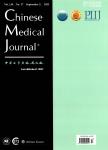Effects of extracellular signal-regulated kinase (ERK) on focal cerebral ischemia
Effects of extracellular signal-regulated kinase (ERK) on focal cerebral ischemia作者机构:Department of NeurosurgeryNeurological InstituteHuashan HospitalFudan University Department of NeurosurgeryCrosby Neurosurgery ResearchUniversity of Michigan
出 版 物:《Chinese Medical Journal》 (中华医学杂志(英文版))
年 卷 期:2003年第116卷第10期
页 面:1497-1503页
核心收录:
学科分类:1002[医学-临床医学] 100204[医学-神经病学] 10[医学]
主 题:ischemia,brain mitogen-activated protein kinase middle cerebral artery occlusion
摘 要:Objective To determine the role of extracellular signal-regulated kinase (ERK)1/2 during focal cerebral *** Left middle cerebral artery occlusion (MCAO) was undergone after the introduction of a nylon suture to the left internal carotid artery in 70 male adult CD-1 mice. ERK 1/2 phosphorylation was detected using Western blot analysis,and the morphological feature was determined by immunohistochemistry. An ERK pathway inhibitor,1,4-diamino-2,3-dicyano-1,4-bis[2-amino-phenylthio] butadiene (U0126),was administered intravenously 20 minutes before MCAO,and the neurological deficit levels and the infarct volumes were measured 24 hours after *** Phosphorylated ERK 1/2 (pERK 1/2) activity increased after 30 minutes of MCAO and peaked at 2 hours. The immunohistochemical study displayed a large number of pERK 1/2 positive cells in the ischemic basal ganglion and surrounding cortex. Double-labeled fluorescent staining identified the pERK1/2 positive cells as neurons or astrocytes. In U0126 treated mice which had undergone 24 hours of MCAO,the neurological deficit levels and the infarct volumes were 44.6% and 45.8% respectively,less than those of the control *** ERK plays an important role in focal cerebral ischemia and inhibition of the ERK pathway can help protect against ischemic brain injury,which may provide a therapeutic approach for cerebral ischemia.



